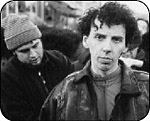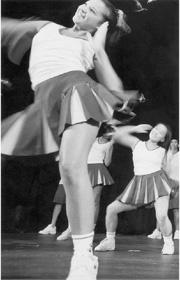ONE THING’S FOR sure, he won’t be accused of babe-casting. Harmony “freaks-are-cool” Korine serves up another smorgasbord of homely characters in his disturbing second film. With figures that often look like Robert Crumb drawings brought to life, he forges intense, unforgettable pictures of a less-than-idyllic world.
JULIEN DONKEY-BOY
directed by Harmony Korine
starring Ewen Bremner, Chlo렓evigny, and Werner Herzog
opens October 29 at Varsity
At the center is Ewen Bremner (Trainspotting), who casts a convincingly frightful figure as the psychotic half-wit Julien. The film opens with Julien’s bony, knifelike body huffing the raw air of winter, his eyes moving rapidly like a wild animal’s. With gold caps on his front teeth and a shock of curly black hair, Bremner is almost unrecognizable from his more comic roles.
The film revolves around the members of Julien’s dysfunctional family. With her blonde hair permed into a fuzzy ball, Chlo렓evigny plays his sister Pearl, seven months pregnant yet toe-dancing in a leotard and tutu. The identity of the baby’s father is a mystery, but there are a few hints that their sibling relationship may be inappropriate—as when Julien, clad only in briefs, role-plays with Pearl on the phone.
Their overbearing father, played by the acidic Werner Herzog, is prone to getting drunk off Robitussin, his head clouded with memories of his youth in Germany. His authority seems directed mostly towards his younger son, Chris (Evan Neumann), whom he tries to mold into a superathlete: Dad hoses the lanky youth with cold water and orders him not to shiver, to “be a man, a winner.”
Filmed on handheld digital cameras per the hip, stringent Dogma 95 guidelines of Lars Von Trier and Thomas Vinterberg, julien has the grainy look of a home video, and one often wishes for more focus. (Korine gained their approval despite some optical tricks.)
Yet as in his 1998 Gummo, Korine relies too heavily on his freaks, just stringing them together in a series of vignettes. He doesn’t see the obvious—that an armless man or a tuxedoed gent swallowing burning cigarettes isn’t that interesting without a story. That his film manages to communicate any real emotions is only due to his talented cast.
Bremner gives an especially accomplished performance. His Julien is a tragic beast driven by whims of untamed energy, in which every high ends in despair. One moment he’s playing with a boy and his turtle; the next, he’s burying the kid in the mud, his own face darkened with confusion. It’s more than the face of abject remorse; it’s of not understanding what went wrong.







